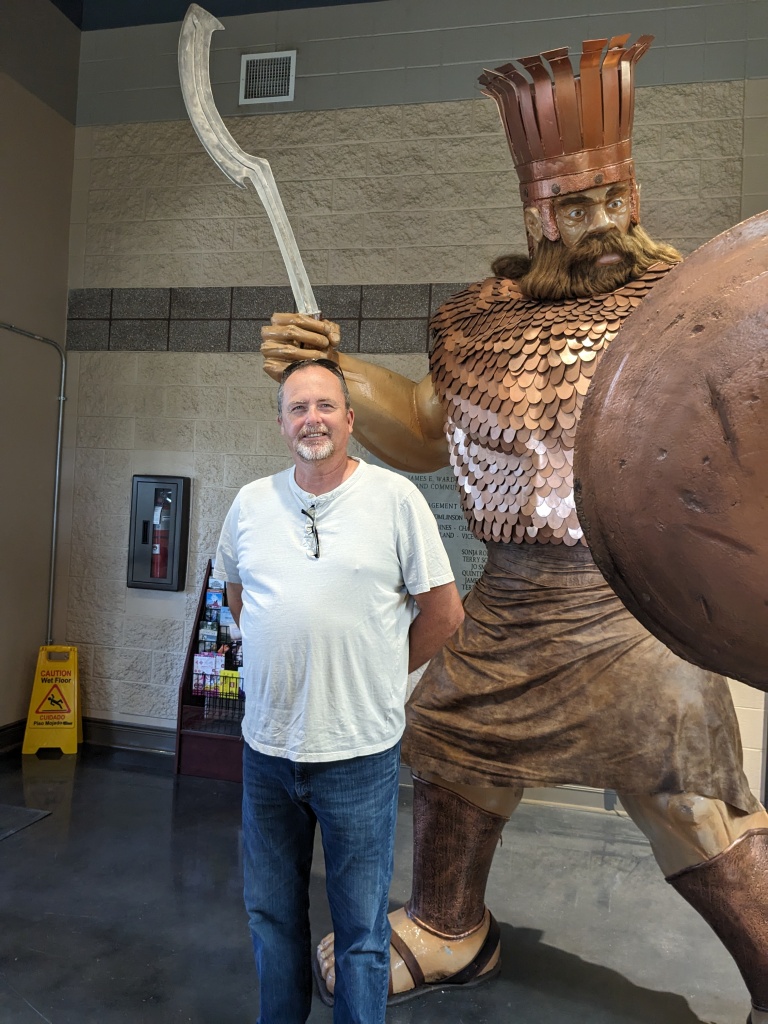
David once again shows us what genuine trust in the Lord looks like. He apparently had an amazing opportunity to end his troubles and enter his destiny as God’s chosen king. However, David refused to take it, because it involved harming the man who was trying to kill him. It was more important to him to be right with the Lord than to achieve his ambitions. He trusted that the Lord would bring it about in His own time, and he, David, would not have to compromise to receive what God had promised.
To listen to the sermon, click the play button:
For some people, the player above may not work. If that happens to you, use the link below to either download, or open a player in a new page to listen.
To download, right click on the link (or do whatever you do on a Mac) and save it to your computer: Download 1 Samuel Part 25
1 SAMUEL #25. CHAPTER 24:1-22
This is one of my favorite stories in the entire history of David. I think what David does, and what he refrains from doing in 1 Samuel 24, shows more courage, faith and heart for God than any of his amazing feats in battle. This is David at his best.
I want to briefly summarize the end of chapter 23, since we did not cover it in detail anywhere else. After David left the town of Keilah, he took his men and went into the wilderness on the other side of the Judean mountains. It may have been more green there 3,000 years ago, but these days, it is mostly desert. It was farther away from Saul, and in terrain that was significantly more rugged. Even so, Saul pursued David there several times, hoping to capture or kill him. During this time, Jonathan came secretly to David, and “encouraged him in his faith in God.”
I think I mistakenly said in an earlier sermon that the last time David and Jonathan ever saw each other alive was recorded in chapter 20. I was wrong, obviously. However this, here, in chapter 24, was indeed the last time the Bible records them being together. I want to focus for a minute on this last meeting of the two friends:
15 David was in the Wilderness of Ziph in Horesh when he saw that Saul had come out to take his life. 16 Then Saul’s son Jonathan came to David in Horesh and encouraged him in his faith in God, 17 saying, “Don’t be afraid, for my father Saul will never lay a hand on you. You yourself will be king over Israel, and I’ll be your second-in-command. Even my father Saul knows it is true.” 18 Then the two of them made a covenant in the LORD’S presence. Afterward, David remained in Horesh, while Jonathan went home. (1 Samuel 23:15-18, HCSB)
Remember, Jonathan, like David, had a heart for God. Like David, he was filled with faith, and confident that God would fulfill his plan. In fact, Jonathan was entirely at peace with the idea that David, not he, himself, should be the next king. What a contrast between Saul and his son! Saul thought David might be God’s next chosen king, and his reaction was to be filled with hate and fear, and to try and kill David. Jonathan thought the same thing, but his reaction was to encourage David. Jonathan’s faith is even more amazing when you think about the fact that at this time, David was running for his life. It sure didn’t look like David was ever going to be king. Even so, Jonathan had confidence that the Lord would take care of David, and that he would make sure his plan indeed happened. Jonathan himself encouraged David with this attitude.
I love that one line: Jonathan encouraged David in his faith in God. Even David, man of God, sometimes needed encouragement to continue to trust the Lord. If that was true of David, how much more so of us.
The people of the region betrayed David, as the citizens of Keilah had done. When you read the Psalms that David wrote, you will often find references to treacherous people, liars and friends who betray. This is because this sort of thing happened to David astonishingly often. In spite of his integrity and the help he brought to others, in spite of his faithfulness to God and respect for Saul as king, people were quick to believe the worst of him, and spread lies about him, and betray him to Saul.
I don’t know about you, but this encourages me. I think my natural expectation is that if I surrender my life to Jesus and have integrity in letting him live through me, people will see it, and like it, and praise God for it. I expect a positive response to God’s life shining through me. I expect good results, and favor with people. But Jesus said we ought to expect the opposite:
18 “If the world hates you, understand that it hated Me before it hated you. 19 If you were of the world, the world would love you as its own. However, because you are not of the world, but I have chosen you out of it, the world hates you. 20 Remember the word I spoke to you: ‘A slave is not greater than his master.’ If they persecuted Me, they will also persecute you. If they kept My word, they will also keep yours. 21 But they will do all these things to you on account of My name, because they don’t know the One who sent Me. (John 15:18-21, HCSB)
He explains that there is blessing for us in this situation:
10 Those who are persecuted for righteousness are blessed, for the kingdom of heaven is theirs. 11 “You are blessed when they insult and persecute you and falsely say every kind of evil against you because of Me. 12 Be glad and rejoice, because your reward is great in heaven. For that is how they persecuted the prophets who were before you. (Matt 5:10-12, HCSB)
Peter, in his first letter, also talks about this:
19 For it brings favor if, mindful of God’s will, someone endures grief from suffering unjustly. 20 For what credit is there if you sin and are punished, and you endure it? But when you do what is good and suffer, if you endure it, this brings favor with God. (1Pet 2:19-20, HCSB)
13 And who will harm you if you are deeply committed to what is good? 14 But even if you should suffer for righteousness, you are blessed. Do not fear what they fear or be disturbed, (1Pet 3:13-14, HCSB)
Seeing the life of David, and hearing what the New Testament says, gives me hope. Being a person with a heart for God is not necessarily a way to get a whole bunch of people to like you. It isn’t a road to sure success. It is often the opposite. But I cling to these promises that there is great blessing for us in those sorts of trials, sooner or later. At this point for David, he experienced the persecution, but not the blessing.
At one point, David was almost caught. He and his men were in a valley or canyon, and Saul and his men were coming down another valley on the opposite side of the mountain. They were gaining on David. But before they could close, messengers found Saul, reporting that the Philistines were attacking elsewhere in Israel. Saul had to break off the pursuit. Once again, I want to point out that David did not know what his future held. He didn’t know for sure what God was doing, and he might very well have been caught. In that particular incident, it must have seemed like it was merely lucky timing that saved him.
And then we come to the incident described in chapter 24. Saul was back to his new hobby of trying to find David and kill him. He and his men were traipsing around the rugged desert and mountain terrain where, according to rumour, David was hiding. They weren’t having any luck. David appeared to be miles away. One day, Saul had to relieve himself, and he went into a cave alone for privacy. It just happened to be the cave where David and some of his men were holed up.
I want to make sure we understand the scenario. David was anointed by Samuel to be God’s chosen instrument. David and his brothers (who were there at the anointing, and with him in his trials) probably assumed that the anointing also meant that he was supposed to be Israel’s next king. Jonathan certainly thought so, and so did Saul, and probably, along with his brothers, the rest of David’s men. Israel’s present king – Saul – who was no longer God’s instrument, has been trying for a long time to kill David. Now Saul was alone, unarmed and unaware, standing right in front of David, sun-blind in the dark cave, back-turned with his pants down. Saul could not have been more helpless.
David could not have possibly have had a better opportunity to kill Saul without hurting anyone else.
David’s men believed that this was a gift from God. Surely Now was the time for David to kill Saul, and become king himself. I suspect that nine people out of ten would agree with David’s men. Killing Saul at that moment would have been easily justifiable self-defense – after all, Saul was there for the express purpose of killing David. Saul was acting contrary to God’s stated will and purposes – he was trying to kill God’s chosen instrument. So killing Saul would be not only self-defense, but also protection of God’s work in the world. I don’t believe there was a person living at the time who would have blamed David.
Hopefully, you have read the scripture. You know what happens: David creeps forward, knife held low and ready. He raises his arm to strike…and then lowers it, and quietly cuts off the corner of Saul’s robe. He creeps back to his men, and a furious but quiet argument ensues. Now David’s men, seeing that he will not kill Saul, are eager to do the deed themselves. Once again, who could have blamed David if he had let one of his men do it? Not only would he have the justifications listed already, but he could always claim that it wasn’t actually him who killed Saul, and he really didn’t want it to happen. But David argues vehemently, and commands his men not to touch Saul. Finally, Saul leaves the cave and the opportunity is lost.
I picture that the cave was up on the slope of a hill or something. After Saul has gone down a little ways, David emerges, and calls to Saul. He bows low to the ground in respect. Then he shows Saul the corner of his robe and says:
11 See, my father! Look at the corner of your robe in my hand, for I cut it off, but I didn’t kill you. Look and recognize that there is no evil or rebellion in me. I haven’t sinned against you even though you are hunting me down to take my life. 12 “May the LORD judge between you and me, and may the LORD take vengeance on you for me, but my hand will never be against you. 13 As the old proverb says, ‘Wickedness comes from wicked people.’ My hand will never be against you. (1Sam 24:11-13, HCSB)
All this wisdom from a man not yet thirty years old. But of course, it wasn’t really David’s wisdom – it was the Spirit of God at work within David. I think the key is verse 12: “May the Lord judge between you and me, and may the Lord take vengeance on you for me, but my hand will never be against you.” David literally refused to take matters into his own hands. Remember when Saul was about to lose the entire southern portion of Israel? His army was deserting him, Samuel wasn’t showing up, and so Saulheld a worship service merely for the purpose of getting people to stick around. Saul took matters into his own hands. But David would not do that. His trust was not in what he could do, but in what the Lord said the Lord would do.
We tend to look at circumstances as if they “prove” what God wants us to do. I think this is a very dangerous tendency. I knew a man who thought God was calling him to have an affair, because he felt that circumstances had so clearly put him and the other woman together. He thought it must be God. I am not making this up. It might be better to wonder if circumstances are being used by the devil to tempt us. Now, I’m not saying that circumstances never align with God’s will, but it should not be our default position to think that.
However, there is a natural question. When God sends your enemy into your cave with his pants down, unable to see in the dark, facing away from you, how do you know that it isn’t God’s will for you to kill him? I mean, we’ve already offered many reasons why no one would condemn David for doing it. So how did David know he shouldn’t do it?
I think there are two answers. The first is one that I never get tired of talking about: we need to live in a day-by-day, moment-by-moment relationship with the Lord. The ten commandments told David not to murder, but it would have been easy to justify it as self-defense, or war, not murder. David, like us, had to rely on a connection of faith with the Lord. Through that faith, the Lord communicated to him that it would be wrong. In the first place, let’s get real: if stabbing an unarmed, unaware person in the back isn’t murder, what is? David knew that the word of God was against murder.
We might say also, that David knew in his heart that to kill Saul was wrong. However the reason he knew it in his heart is because he knew the word of the Lord (in this case, “do not murder”), and he knew the Lord himself. It isn’t some mystery. If we want to know the will of the Lord, we too need to know His Word (the Bible) and spend time with him in prayer, worship and fellowship with other believers. Without that, what we “know in our hearts” might be very, very wrong.
I also think that for David, the Lord guided him in this situation through other “ordinary” factors. David, at least for a while, viewed Saul like a second father. Though Saul seemed to hate David, David did not hate in return. He still respected him, and had affection for him, and he was sad that they couldn’t have the relationship they used to have. In addition, I think David probably thought something like this: “How could I ever look my best friend Jonathan in the eye again, if I kill his father?” These might seem like very ordinary, “unspiritual” factors to go into such an important decision, but I think that the Lord uses exactly such things to guide us at times. He made each one of us. He knows the way each of us tends to make decisions, and honestly, I think we are too quick to put things into the category of “spiritual” and “unspiritual.” In my own opinion, everything is spiritual, because all of life belongs to the Lord.
Another thing is this: I think the Lord allowed David to see that to kill Saul at this point would be taking matters into his own hands, rather than trusting. I believe that there are times when God calls us to act speedily and courageously without hesitation. But there are also times when the Lord calls us to let opportunities pass by, and trust Him to bring about his purposes in his own way. Personally, I think the second way is harder, and in our culture we almost never think that way. We typically assume that if we see a means to meet our goals, it is God giving us that chance, and we should take it. Sometimes, that may indeed be true. But sometimes the Lord calls us to wait and trust so we can receive it from him, not get it by our own effort. Especially in our world today, I think we need to consider waiting on God as a first option, and only act if we are sure God wants us to. I say this because our culture will never encourage us to do that. We are taught by everything around us to act rather than wait.
Consider this: if David had killed Saul at this point, he might always afterwards wonder if God really wanted him to be king, or, if he had simply made himself king. And there was something that was more important to David than reaching his goal of becoming king. It was more important to him to be right with the Lord than to achieve his ambitions. So he said, “Yes, I’d like the Lord to judge you Saul, for what you’ve done. But my priority is not to judge you, nor to make my goals happen. My priority is to be right with the Lord.”
I want to point out that David did not meekly accept the way Saul was abusing him. He confronted Saul about how unjust he was being. He had proved his loyalty, and proved Saul’s own suspicions to be false, and he pointed those things out to Saul. He confronted Saul with the truth, but he left judgement to the Lord. So, when we are treated badly, it is not necessarily wrong to speak out against it. It’s not necessarily wrong to get out of a bad situation if we can. But like David, we can leave judgment to God.
So, today, what’s your priority? Think of something that you really, truly want. Now imagine that you have the power to make it happen, right now. It would be easy. Would you do it, even if you knew in your heart that God didn’t want you to?
Now, I don’t want the message to be that we are just not as righteous as David. That’s not actually true. David wasn’t any better than us. He just learned to trust God, and he made that trust the primary and most important part of his life. But he wasn’t perfect. In fact, we’ll see in the next chapter that David forgot every thing he had demonstrated here, and had to be reminded of it. So, the message is: Trust God. I’ll say it again: Trust God. The thing that you want so much, the thing that you are convinced is even God’s will for you – God will take care of that. David eventually did become king. It didn’t happen that day. In fact it was still years away. But God did take care of it. He worked it out the best way possible.
I want to add something else. Maybe you’ve tried to trust God, and you haven’t been able to do it like David did. Understand this: David trusted God by the power of the Holy Spirit. If we want to trust God, it is more about surrender to the work of the Holy Spirit in us than about us trying hard. It’s about giving permission to the Lord to lead you. Once you give that permission, and you surrender your choice to God’s best will, search the scriptures, and if you have no definitive answer from that, do what seems best, trusting that the Lord is leading you.
Also, we need to remember that when we fail, we have the Anointed One, Jesus, who trusted God perfectly, on our behalf. He did what we could not do, so that when we fail (not if!), we can trust that he has made it right between us and God. To do better next time, the main thing we need is more trust.
So trust him.










